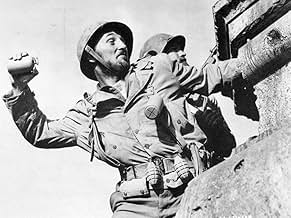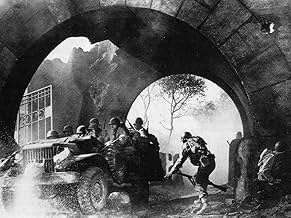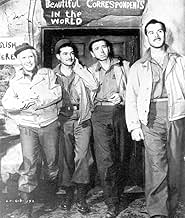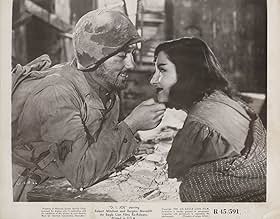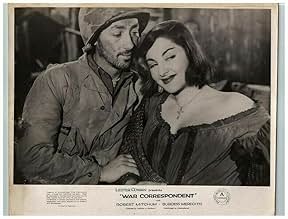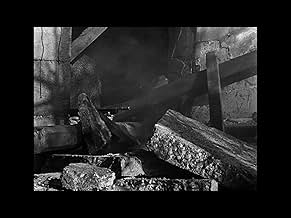IMDb रेटिंग
7.2/10
4.1 हज़ार
आपकी रेटिंग
अपनी भाषा में प्लॉट जोड़ेंAt the close of WWII, Pulitzer Prize-winning war correspondent Ernie Pyle travels with, and reports on, the U.S. Army's 77th Infantry Division during their liberation of Italy.At the close of WWII, Pulitzer Prize-winning war correspondent Ernie Pyle travels with, and reports on, the U.S. Army's 77th Infantry Division during their liberation of Italy.At the close of WWII, Pulitzer Prize-winning war correspondent Ernie Pyle travels with, and reports on, the U.S. Army's 77th Infantry Division during their liberation of Italy.
- 4 ऑस्कर के लिए नामांकित
- 5 जीत और कुल 8 नामांकन
John R. Reilly
- Private Murphy
- (as Jack Reilly)
William Murphy
- Private Mew
- (as Bill Murphy)
William 'Billy' Benedict
- Pvt. Whitey
- (बिना क्रेडिट के)
Michael Browne
- Sergeant
- (बिना क्रेडिट के)
Dorothy Coonan Wellman
- Nurse Lt. Elizabeth 'Red' Murphy
- (बिना क्रेडिट के)
Bob Hope
- Bob Hope (Voice on Radio Program)
- (वॉइस)
- (बिना क्रेडिट के)
Kenneth Kendall
- Extra
- (बिना क्रेडिट के)
Yolanda Lacca
- Amelia, Italian Girl
- (बिना क्रेडिट के)
Barney Noto
- Staff Sergeant Barney Noto
- (बिना क्रेडिट के)
Tito Renaldo
- Lopez
- (बिना क्रेडिट के)
Dick Rich
- Sergeant at Showers
- (बिना क्रेडिट के)
William Self
- Pvt. Cookie Henderson
- (बिना क्रेडिट के)
फ़ीचर्ड समीक्षाएं
The term "G.I. Joe" has become so closely associated with the image of a certain toy that it is now largely forgotten that it was originally coined to describe the ordinary American foot soldier. Likewise, it is now largely forgotten just exactly who Ernie Pyle was and what he meant to the American people and, more especially, to the ordinary soldiers about whom he wrote.
My father took a photograph of Ernie Pyle in the Pacific in 1945, shortly before Pyle was killed. At the time Pyle was surrounded by a mob of admiring G.Is. You'd have thought they were in the presence of Bettie Grable or Rita Hayworth rather than a short, balding, middle aged newspaper-man. When Pyle was killed in action a few days later while accompanying the infantry, the solders erected a monument at the place where he died. On it were engraved the words, "On this spot the 77th Division lost a buddy", and they really meant it. It's inconceivable that troops today would do anything like that for one of the current crop of CNN-generation reporters.
The reason isn't hard to fathom. Most war correspondents hung around the rear echelon, hobnobbing with the general staff and forwarding dispatches from headquarters, and they still do. Pyle, on the other hand, lived with and wrote about the common infantrymen who were actually fighting the war. He ate their food, drank their coffee and shared their hardships through three grueling years of war from North Africa through Sicily to the European mainland, and then later on in the Pacific, where he was killed. Pyle became the spokesman for the common soldiers, and all their families back home read his syndicated column. There simply wasn't anybody else like him then, and there hasn't been since.
Small wonder that William Wellman, himself a combat veteran, thought that this movie needed to be made. The filmmaker had tremendous respect for his subject, and it shows. For example, that poignant last scene is, almost word for word and image for image, straight out of one of Pyle's most famous dispatches. It would have been interesting to learn what Pyle thought of this film. Unfortunately, however, by the time it was released the Pulitzer Prize-winning reporter was already dead.
My father took a photograph of Ernie Pyle in the Pacific in 1945, shortly before Pyle was killed. At the time Pyle was surrounded by a mob of admiring G.Is. You'd have thought they were in the presence of Bettie Grable or Rita Hayworth rather than a short, balding, middle aged newspaper-man. When Pyle was killed in action a few days later while accompanying the infantry, the solders erected a monument at the place where he died. On it were engraved the words, "On this spot the 77th Division lost a buddy", and they really meant it. It's inconceivable that troops today would do anything like that for one of the current crop of CNN-generation reporters.
The reason isn't hard to fathom. Most war correspondents hung around the rear echelon, hobnobbing with the general staff and forwarding dispatches from headquarters, and they still do. Pyle, on the other hand, lived with and wrote about the common infantrymen who were actually fighting the war. He ate their food, drank their coffee and shared their hardships through three grueling years of war from North Africa through Sicily to the European mainland, and then later on in the Pacific, where he was killed. Pyle became the spokesman for the common soldiers, and all their families back home read his syndicated column. There simply wasn't anybody else like him then, and there hasn't been since.
Small wonder that William Wellman, himself a combat veteran, thought that this movie needed to be made. The filmmaker had tremendous respect for his subject, and it shows. For example, that poignant last scene is, almost word for word and image for image, straight out of one of Pyle's most famous dispatches. It would have been interesting to learn what Pyle thought of this film. Unfortunately, however, by the time it was released the Pulitzer Prize-winning reporter was already dead.
I found this to be a particularly poignant film about WWII - no heroics, just the simple getting through the day & night of a company of US infantry. Much like Ernie Pyle humanized the 'G. I.' in his written pieces, Wellman does the same on film. The heat, dirt, cold, mud, rain...fear, uncertainty, waste - it's all here without the bombast and manipulation of "Saving Private Ryan'. The performances are wonderful - most of the performances were given not by professionals but by the soldiers themselves. There is one scene between Mitchum and Meredith that was apparently an audition film - it was so right, it was simply inserted into the film. There are human touches throughout, as well as the insanity of war. I would strongly recommend this film to anyone who has an appreciation for the director, actors, theme. It's not a grisly film, and it is slow, but overall well worth watching.
And war was fought in the rain and the mud and the cold....In today's wars fought on film there is very rarely a look at the true living conditions that existed. This movie does not clean up the actors (as most films do). You see here all of the gritty, day-to-day, living during the war. These guys did not clean up every day. This is a good story about WW2. Be sure to see it. 8/10
After searching for the best war films all my life, and after seeing so much tripe, I was completely flabbergasted by this film, of which I had heard, but had never seen until last night. Most films made during the Second World War were pure propaganda, all dash and glory, but with little resemblance to real battle. "The Story of G.I. Joe" is the real McCoy, especially considering that it was made near the end of the war. You can feel, taste and smell the muck and fear these men lived with. The dialogue is gritty, the combat scenes, especially of urban fighting bang on. One exceptional and rare scene was of an anti-tank gun crew swinging into action and firing 12 rounds a minute in a town. It was a battle ballet and an example of the lethality of a well-trained and seasoned team. In my opinion, this film ranks with Steven Spielberg's "Saving Private Ryan" as the best film of infantry in combat ever made. In fact, I believe that Spielberg may even have made 'Ryan' as an homage to Wellman's great earlier film; many of the scenes and much of the dialogue is very similar. In 1945, General Eisenhower called 'G.I. Joe' the greatest war film ever made. I'm sure he would say the same thing today. This should be a must-see for every student studying this country's fighting history and every American in uniform should see it.
The Story of G.I. Joe chronicles the experiences of an infantry unit in Italy as told by war correspondent Ernie Pyle, who is played by Burgess Meredith. War weary Robert Mitchum plays the platoon leader. While we can see that the movie was largely made in the studio, the great photography and direction move it along. Cold feet, mud, frustration, and homesickness are effectively demonstrated at the expense of battle scenes.
क्या आपको पता है
- ट्रिवियाThe extras in the film were real American GIs, in the process of being transferred from the war in Europe to the Pacific. Many of them were killed in the fighting on Okinawa--the same battle in which Ernie Pyle was killed by a Japanese machine gunner--never having seen the movie in which they appeared.
- गूफ़The unit Pyle is with--the 18th Infantry Regiment, 1st Infantry Division--never fought in the Italian campaign. After the Sicilian campaign ended, it was brought back to England and began training for the D-Day invasion in Normandy. The 1st Division would eventually spearhead the assault on Omaha Beach.
- भाव
Pvt. Dondaro: If this War don't kill me first, my feet will.
- क्रेज़ी क्रेडिटThere are absolutely no credits at the end of the film, not even the words "The End".
- कनेक्शनEdited from San Pietro (1945)
- साउंडट्रैकSilent Night
(uncredited)
Music by Franz Xaver Gruber
Lyrics by Joseph Mohr
Sung by Elfie Mayerhofer on Decca Record
टॉप पसंद
रेटिंग देने के लिए साइन-इन करें और वैयक्तिकृत सुझावों के लिए वॉचलिस्ट करें
- How long is Story of G.I. Joe?Alexa द्वारा संचालित
विवरण
- रिलीज़ की तारीख़
- कंट्री ऑफ़ ओरिजिन
- भाषाएं
- इस रूप में भी जाना जाता है
- También somos seres humanos
- फ़िल्माने की जगहें
- Iverson Ranch - 1 Iverson Lane, Chatsworth, लॉस एंजेल्स, कैलिफोर्निया, संयुक्त राज्य अमेरिका(marching through countryside just before the "baptism of fire.")
- उत्पादन कंपनी
- IMDbPro पर और कंपनी क्रेडिट देखें
बॉक्स ऑफ़िस
- बजट
- $10,00,000(अनुमानित)
- चलने की अवधि1 घंटा 48 मिनट
- रंग
- पक्ष अनुपात
- 1.37 : 1
इस पेज में योगदान दें
किसी बदलाव का सुझाव दें या अनुपलब्ध कॉन्टेंट जोड़ें


